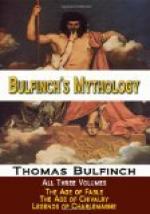with this knight.” “Sir,” said
the hurt knight, “you shall have it, with a
right good will,” Then Sir Tristram unarmed
Sir Galleron, for that was the name of the hurt knight,
and he as well as he could helped to arm Sir Tristram.
Then Sir Tristram mounted upon his own horse, and
in his hand he took Sir Galleron’s spear.
Thereupon Sir Palamedes was ready, and so they came
hurling together, and each smote the other in the
midst of their shields. Sir Palamedes’
spear broke, and Sir Tristram smote down the horse.
Then Sir Palamedes leapt from his horse, and drew out
his sword. That saw Sir Tristram, and therewith
he alighted and tied his horse to a tree. Then
they came together as two wild beasts, lashing the
one on the other, and so fought more than two hours;
and often Sir Tristram smote such strokes at Sir Palamedes
that he made him to kneel, and Sir Palamedes broke
away Sir Tristram’s shield, and wounded him.
Then Sir Tristram was wroth out of measure, and he
rushed to Sir Palamedes and wounded him passing sore
through the shoulder, and by fortune smote Sir Palamedes’
sword out of his hand And if Sir Palamedes had stooped
for his sword Sir Tristram had slain him. Then
Sir Palamedes stood and beheld his sword with a full
sorrowful heart. “Now,” said Sir
Tristram, “I have thee at a vantage, as thou
hadst me to-day; but it shall never be said, in court,
or among good knights, that Sir Tristram did slay
any knight that was weaponless; therefore take thou
thy sword, and let us fight this battle to the end.”
Then spoke Sir Palamedes to Sir Tristram: “I
have no wish to fight this battle any more. The
offence that I have done unto you is not so great
but that, if it please you, we may be friends.
All that I have offended is for the love of the queen,
La Belle Isoude, and I dare maintain that she is peerless
among ladies; and for that offence ye have given me
many grievous and sad strokes, and some I have given
you again. Wherefore I require you, my lord Sir
Tristram, forgive me all that I have offended you,
and this day have me unto the next church; and first
I will be clean confessed, and after that see you
that I be truly baptized, and then we will ride together
unto the court of my lord, King Arthur, so that we
may be there at the feast of Pentecost.”
“Now take your horse,” said Sir Tristram,
“and as you have said, so shall it be done.”
So they took their horses, and Sir Galleron rode with
them. When they came to the church of Carlisle,
the bishop commanded to fill a great vessel with water;
and when he had hallowed it, he then confessed Sir
Palamedes clean, and christened him, and Sir Tristram
and Sir Galleron were his godfathers. Then soon
after they departed, and rode towards Camelot, where
the noble King Arthur and Queen Guenever were keeping
a court royal. And the king and all the court
were glad that Sir Palamedes was christened.
Then Sir Tristram returned again to La Joyeuse Garde,
and Sir Palamedes went his way.




